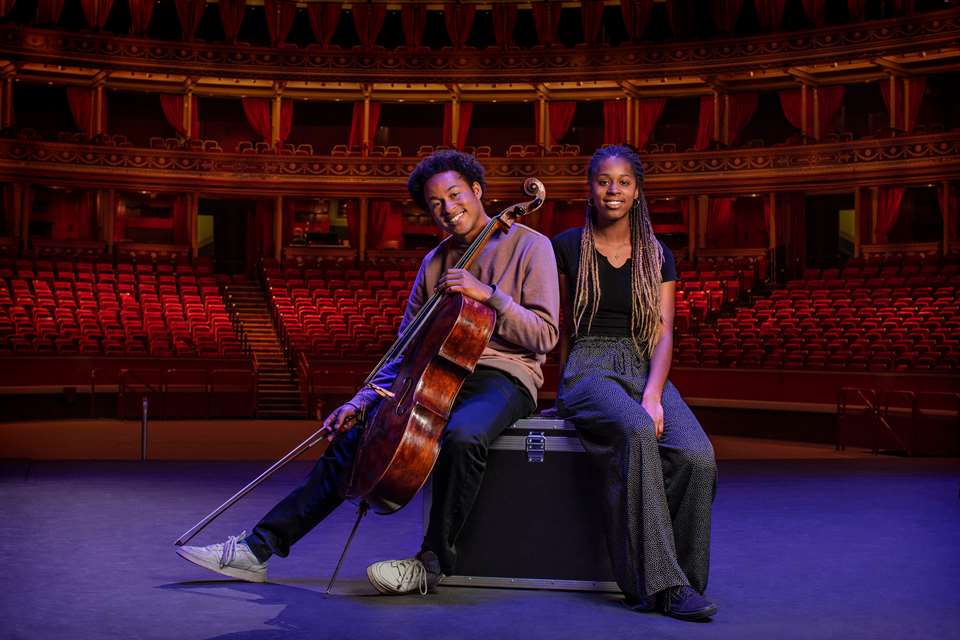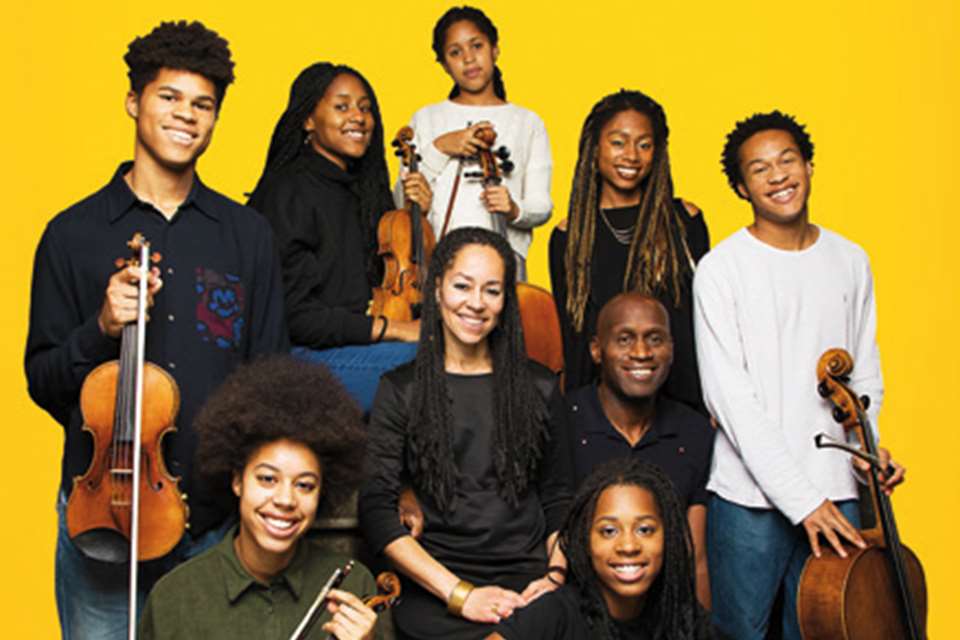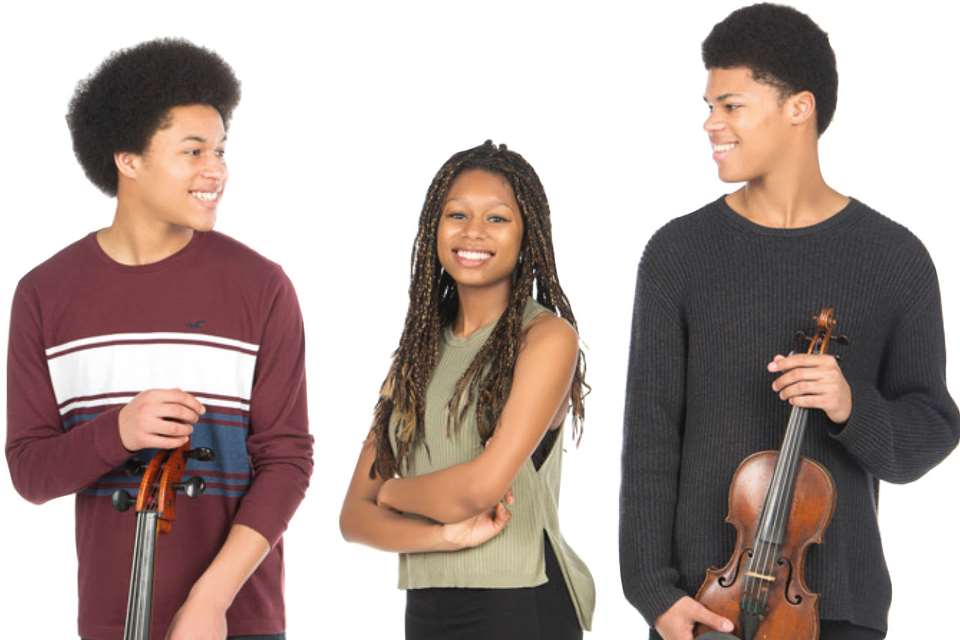Quiet strength: Sheku Kanneh-Mason
Harriet Clifford
Friday, October 1, 2021
On the publication of his new collection of cello music, Harriet Clifford meets Sheku Kanneh-Mason to discuss everything from creativity, playing for enjoyment, Brexit and music education to luck, inspiration, and the cellist's yellow socks.
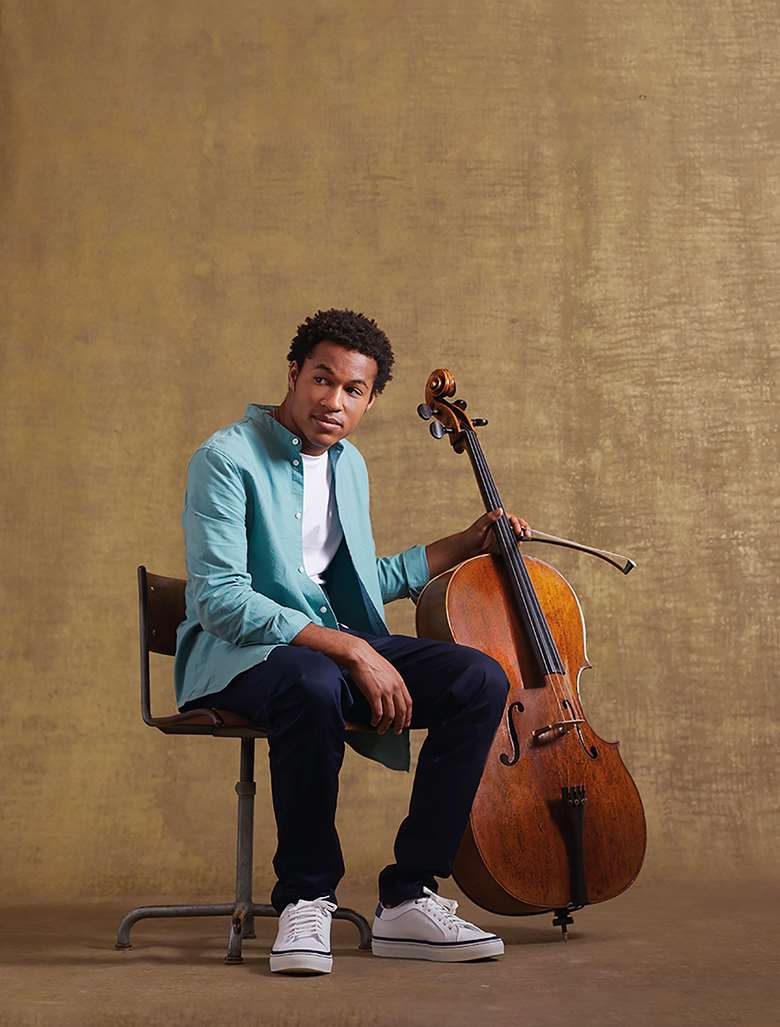
Jake Turney
Twenty-two-year-old Sheku Kanneh-Mason has managed to squeeze our conversation somewhere in between three performances at the Grand Teton Music Festival in Jackson, Wyoming, a trip back to London (where he is for our call), his debut at Hollywood Bowl with the LA Phil and Gustavo Dudamel, a quick trip to Aspen Music Festival, Colorado, and a flight home to prepare for the BBC Proms. The cellist's busy performance schedule is the reason we're speaking in July, mid-heatwave, for an article that won't appear until the October issue of MT. His laptop pings several times during the call, which pointedly reminds me that this young musician is in high demand.
Despite his full-on summer (and possible jetlag), Kanneh-Mason appears very much present in the moment, listening carefully to my questions and responding thoughtfully – he speaks in a way that's eloquent and intelligent but unpolished, and I immediately warm to him. The 2016 winner of BBC Young Musician – appearing as a finalist alongside saxophonist Jess Gillam and French horn player Ben Goldscheider in a particularly fruitful instalment of the biennial competition – has just published The Sheku Kanneh-Mason Cello Collection with Faber Music, but first I want to know how the past 18 months have been for him.
‘Oh,’ he says, apparently surprised to be asked. He thinks for a moment: ‘They've been a mixture of lots of different things that weren't planned and weren't expected. I've been lucky enough to be busy doing other things; some online performances, some performances to smaller audiences and things like that. And a lot of practice.’ Then, almost as an afterthought: ‘I've just finished my undergrad at the [Royal] Academy [of Music], so I've been doing that.’ Kanneh-Mason has been studying cello with Hannah Roberts at the Academy, and from September he returns to pursue an Advanced Diploma in Performance – a one-year qualification usually taken by musicians who already have a postgraduate degree in performance. An internationally renowned cellist signed to Decca Classics, with a royal wedding performance and an MBE under his belt, Kanneh-Mason is probably an exception.
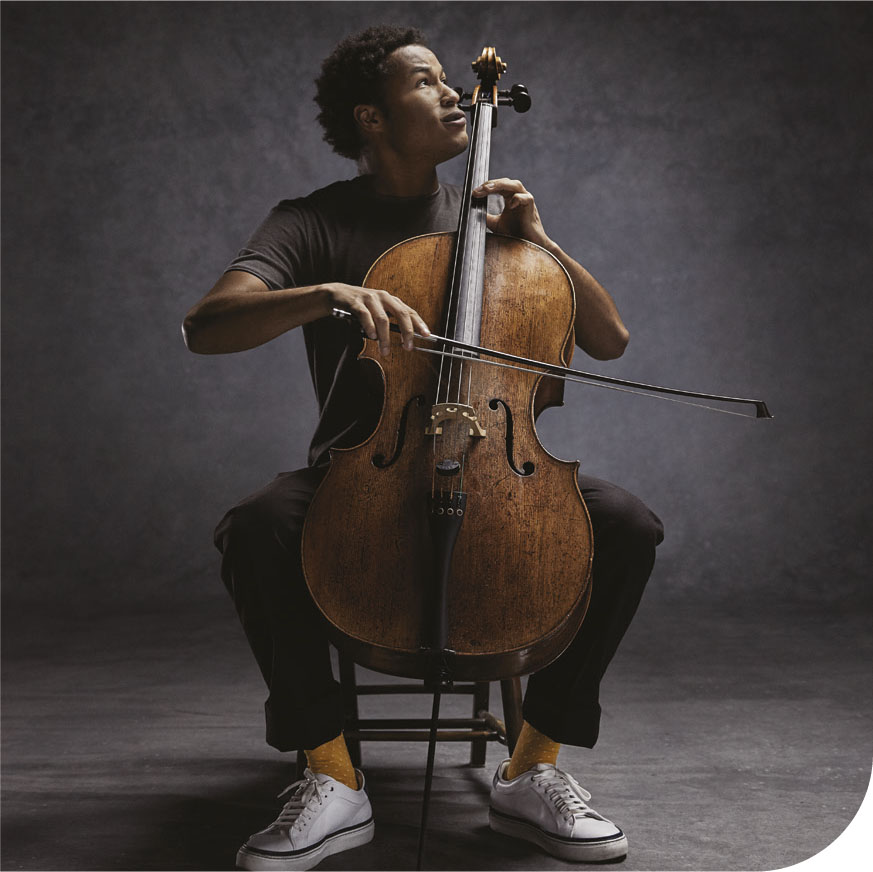
The Cello Collection cover image © JOHN DAVIS
Not ‘the’ way of playing
His Cello Collection was published in July with the strapline, ‘An inspiring and unique selection of pieces for solo cello and cello with piano accompaniment’. Featuring 14 pieces – a combination of Kanneh-Mason's compositions, arrangements, and music he has performed or recorded – the collection includes, among others, No woman, no cry (Vincent Ford, arr. Sheku Kanneh-Mason), Hallelujah (Leonard Cohen, arr. Simon Parkin), Sicilienne (attrib. Paradis, arr. Parkin), Evening of Roses (Josef Hadar, arr. Kanneh-Mason), Elegie (Rachmaninoff, ed. by Kanneh-Mason), and Theme and variations (Kanneh-Mason). On the ‘purpose’ of the book, he tells me: ‘I would say mostly to enjoy playing the cello. Also, to encourage people to be creative in the way that I have been in creating this collection.’
Kanneh-Mason chose to include many of the arrangements because he's often asked for the sheet music after concerts. ‘Until now, I hadn't really written most of them out – I'd just sort of perform them,’ he says. ‘It's so nice that people like them enough to want to see the music and learn it themselves. That is wonderful, and it would be so interesting to see how other people play my arrangements having seen the music.’ At the top of each piece, the musician has written short introductions with some context and ideas for the player, which he says is to provide ‘a bit of insight into the piece’. Kanneh-Mason continues: ‘I've recorded a lot of the pieces, and I didn't want people to simply listen to the music and try and copy what I'm doing. Of course, you can be inspired by how I play it, but I also encourage people to listen around the piece.’
Some of the pieces are songs, so he suggests that players look up the lyrics, listen to the singer, and ‘build their own connection’ with the music. ‘I wrote a few bowings and fingerings and things, but they're just suggestions. Some of them are suggestions for practical reasons, but a lot are suggestions for musical and personal reasons. They're also to encourage people to question those and try and find the reason behind them, instead of seeing them as “the” way of playing.’ In Kanneh-Mason's Theme and variations, each variation focuses on a different element of cello technique, which he says, ‘can be a fun way of learning and practising’, and he also road-tested some of the music on his 12-year-old sister Mariatu: ‘She's learning some of the pieces as well, and I asked her what bowings and fingerings she does, just out of interest.’
Anyone who has heard Kanneh-Mason speak will be familiar with his modesty. I can't help but laugh, though, when I ask him what playing standard the book is aimed at (the back cover says ‘Intermediate and beyond’) and he says: ‘I think it's very much up to the player. I don't know how to describe a level… because I play all of these and I don't know if I would be intermediate, necessarily…’. He laughs at my facial expression, and corrects himself: ‘What I mean is, at any level you can at least have a go at some bits and enjoy it. I remember when I was young, I would listen to recordings of Jacqueline du Pré and try and play the Elgar concerto – of course, I wasn't at the “level” to play it, but I just enjoyed trying to get to know the music.’
Get your priorities straight
Back in June, the young musician hit the headlines when he tweeted that he'd applied for an additional British passport to help with visas and work permit applications, but instead received a cancelled passport with no explanation. Partly thanks to the power of social media, the Home Office quickly rectified the ‘human error’, apologised, and had a passport couriered to Kanneh-Mason's house. Presumably, I ask, he was applying for a second passport because of Brexit? ‘A lot of it was to do with Brexit – travelling to certain places in Europe is now a lot more difficult than it was. The forward-planning and the extra costs are very annoying,’ he says.
For young (younger than Kanneh-Mason, at least) aspiring musicians looking on at the apparent logistical nightmare that is post-Brexit, post-Covid touring, a career as an international musician may not seem particularly appealing. My question of whether Kanneh-Mason has any advice for these onlookers is met with a less-than-reassuring ‘gosh’. He thinks for a moment, then: ‘In many ways, I'm in a lucky position in that I've already been able to build a career that's quite international, but I think starting out building that [now] would be more difficult than it was, in all honesty.’ He continues, ‘I don't know how I would advise [young people], but hopefully things will change. Things have changed and people are able to adapt. If you're determined, then I'm sure it's possible. It's certainly worth it.’
Now that we're on more political ground, the conversation turns to the current landscape of music education in the UK. ‘For me,’ says Kanneh-Mason, ‘the value of having a music education seems very obvious and so distinct, and it should be much more of a priority. If we want to have a future of people who are able to listen, be empathetic and are able to express themselves, those kinds of skills can be developed through music. If the government sees it as a priority, then they'll invest in these subjects, and of course, all of the other creative arts subjects.’ He adds: ‘I'm speaking as a musician, but you can learn those things through dance and drama and all of the things that are becoming less and less of a priority, which I think is a very big mistake.’
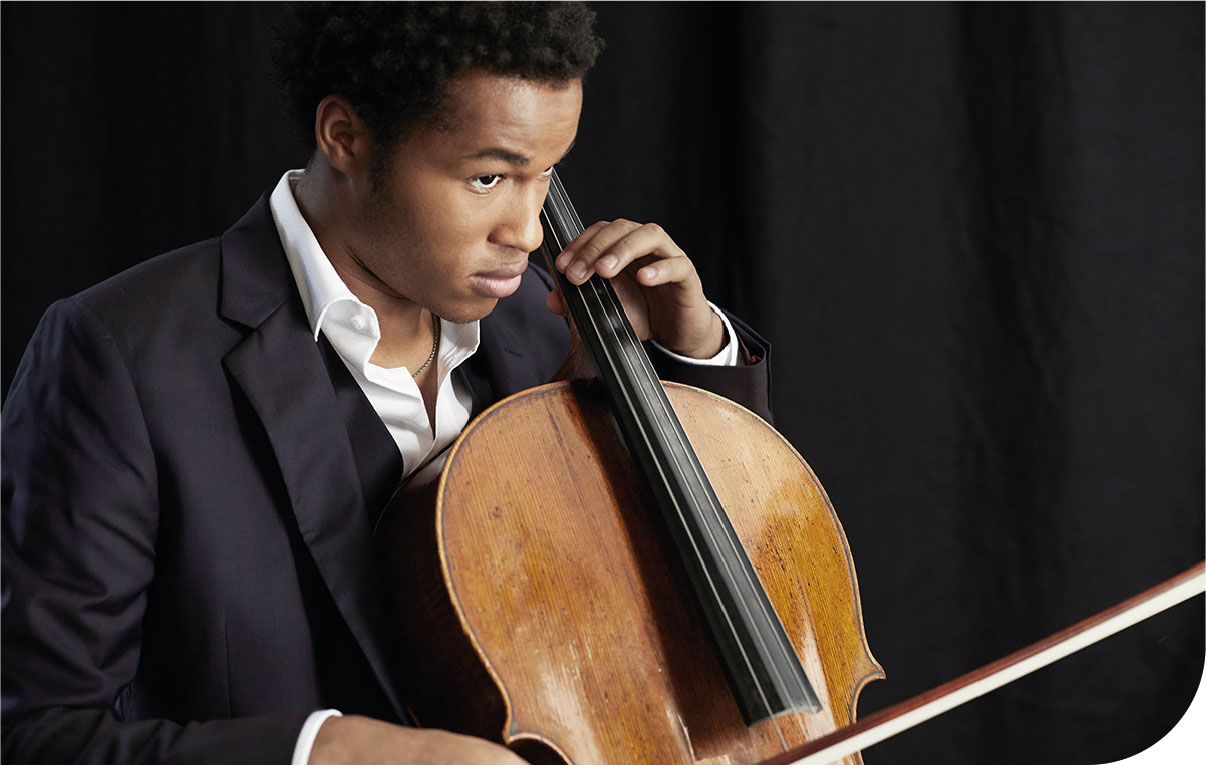 © JAKE TURNEY
© JAKE TURNEY
Luck of the draw?
Calling me from the comfort of his own room, Kanneh-Mason is dressed casually – much like his appearance on the cover of his new book. The dramatically lit image depicts the cellist looking up to the left, wearing rolled-up black jeans, white trainers, and yellow socks. This is surface-level stuff, perhaps, but to me, Kanneh-Mason's understated appearance quietly offers the message: ‘anyone can do what I do’. He says, ‘If I am able to inspire a young person to want to play the cello or be a musician, or just achieve whatever they feel they want to, then that makes it very, very worth it.’
At the end of August, all seven Kanneh-Mason siblings (aged 12–25) played at the BBC Proms in a performance of Saint-Saëns's The Carnival of the Animals, narrated by Michael Morpurgo as a ‘Family Prom’. Although Kanneh-Mason believes that seeing music live is the best way to experience it, he also speaks passionately about how lucky he feels to have access to videos and recordings of ‘great artists' from whom to take inspiration. He isn't talking about himself, of course, but his own music videos (on YouTube) and the Proms concert (on iPlayer for a limited time) will doubtless have this inspirational effect on many.
Before he gets back to his busy schedule, I ask him if he'd change anything about his own music education. Kanneh-Mason looks around his room thoughtfully, then says: ‘I don't think I would change anything. Not to say that everything was perfect, but I'm just grateful that I'm at a point now where I feel I'm able to make my own decisions about how I want to play something. Of course, I still have a teacher who pushes me and challenges me, but I feel very strong in the way that I want to play. That's because of the education I've had and all of the people, musicians, recordings and videos that have influenced me.’ He continues: ‘I always really admire teachers who are able to see their students as individuals – to see what the student needs and responds to most. I've been lucky that all my teachers have really pushed me in the right directions at the right times and have seen what excites me. I admire teachers a great deal – it's such a valuable thing, of course, but it's very hard.’
The word ‘lucky’ has cropped up several times during our conversation. I recently read an Evening Standard interview with his sister Isata upon the release of her piano album Summertime, in which she responds to the word ‘talented’: ‘Talent comes from an interest and inspiration, which is easy to have when you're surrounded by classical music and have the opportunities to play. We were lucky that our parents were music lovers and encouraged us to practise,’ she says.
The Kanneh-Masons are clearly cut from the same cloth, although each sibling is heading in their own musical direction. Despite the degree of ‘constant difficulty’ presented by his chosen pathway, Sheku Kanneh-Mason says: ‘I'm always more focused on being grateful to be here, and I think being able to spend hours and hours a day playing the cello is actually a real luxury, as hard as it is.’ Whether he wants to call it luck, talent, or something else, Sheku Kanneh-Mason has certainly got it in abundance.


